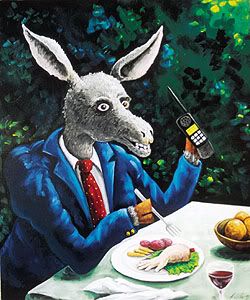Two Kinds of Selfishness
 It is an unfortunate commonplace that morality must be selfless or it is not really morality at all. This has led to all sorts of confusion in ethics. The most common is the assertion that if someone wants to do something moral, it is not really moral. Somehow, morality and self-interest must be in conflict. If someone is acting from desire, he or she is not acting from duty.
It is an unfortunate commonplace that morality must be selfless or it is not really morality at all. This has led to all sorts of confusion in ethics. The most common is the assertion that if someone wants to do something moral, it is not really moral. Somehow, morality and self-interest must be in conflict. If someone is acting from desire, he or she is not acting from duty.One solution presented to this is the "counter-factual" definition of morality. In this case, the agent is considered to be acting morally if he or she would have acted morally even if he or she had not wished to act morally. The problem with counterfactuals is that they are incredibly difficult to establish. Moreover, it is a bizarre claim to say that someone is not somehow a morally better person who does not want to molest children versus someone who wants to molest children, but merely controls himself.
Aristotle addressed this problem by showing how the apparent conflict between selfishness and morality was a sham conflict. Selfishness is only morally bad in a small sphere of goods. These goods are material goods for which there is a limited supply and therefore competition. Selfishness with regard to these goods is bad because it interferes with the virtue of justice. Since the hoi polloi believe that these goods are the only real goods, they claim that selfishness is bad.
However, the virtuous agent is selfish for higher goods, especially virtue itself. Virtue is noble, and the noble soul seeks out virtue before any material good. In fact, the virtuous agent wishes to be just because it is greater than any material good. The virtuous agent will happily and selfishly sacrifice material goods for the good of justice. The hoi polloi believe he or she is acting unselfishly, but virtuous people will realise that this act is in fact selfish. This is not the vicious selfishness that leads to injustice, however, but a noble selfishness that desires virtue.
As such, Aristotle claims that the division between selfishness and morality only makes sense when one believes material goods are the only real goods. Once one realises there are other goods, selfishness will not be a threat to virtue. Instead, true selfishness will be the sign of virtue, as the truly virtuous agent will value virtue above all things.









5 Comments:
psychological determinism selfishness. first, i am a determinist. so, if i make descision, is is the path of least resistance, least harm, or greatest satasfation. let me also interject, i don't beleive we have a choice in our decisions, the same way that lightning doesn't have a choice where it strikes.
simultaniously, i think that we are masters of our reality.
i am fully aware that this is a contradiction, however, i have a point: selfishness is in itself the act of acting in ones interest exclusively, yet, it is often precluded that selfishness is not in the best interest of the whole. I say that the ultimte form of determinism is the selfish act in which it is realized that the outcome is in the best interest of the whole, which in turn is in the best interest of the individual.
also, unrelated to this, i am looking for more information on one's convictions that ultimately lead to their reality. are you up for a discusion?
What a bunch of hooey! People's behavior - regardless of what motivated them - is the only rational thing to judge. If you start trying to "guess" ('cause that's all it is!) what motivated someone to do something you'll drive yourself nuts!
People do things, each of us motivated by as many reasons as different as there are people on the planet. I, for one, am completely content - and even happy - that I don't have to know why everyone individually did what they did, do what they do, and will do what they will do!
I don't consider this lazy thinking; I consider it a pragmatically sane decision. I have often done things which I knew were wrong, immoral, unjust... does this make me an immoral, unjust, etc. person? Yep! That's why EVERYONE needs a Savior! Thank you for helping prove my point about intelligent design (or lack of design)!
This comment has been removed by the author.
Im a philosophy student trying to find a source for my paper I am going to be sending in the mail to graduate colleges on friday. More or less determinism based upon strongest desire is the source.
I am a free will nut, mainly because with the aquired evidence, it um... well its the only real one that deductively exists to one's subjective experience (and yes... that also is the thesis of my paper.)
Anyway, my research has led me to your psychological determinism site twice, but I don't want to use it because psychology is addresed.... oh.... well okay I guess I can since I address the general aspects of psychology. Hey! You just made my Works cited! Anyway...
Feeling overtly percocious and slightly humerous, I just want to say one simple phrase.
I like donkeys, and I love when donkeys wear funny suits.
Right.... i'm off.
Gosh, there is a lot of useful material here!
Post a Comment
<< Home